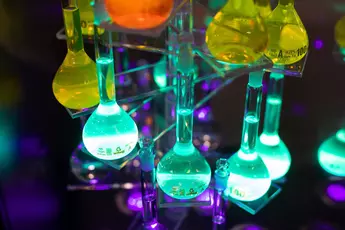analytica 2024: On the path to the zero-carbon lab
December 12, 2023
- Energy-efficient devices for more sustainability in the laboratory
- Alternatives to scarce helium, and environmentally friendly consumables
- Less waste thanks to miniaturization and the like
From analytics in mini format with reduced solvent requirements to energy-efficient laboratory technology: at analytica, the Green Lab becomes reality. Exhibitors from all over the world will be presenting their innovations and sustainability concepts in Munich from April 9 to 12, 2024. “With analytica, we want to help reduce energy and resource requirements as well as the amount of waste generated in the laboratory,” says Armin Wittmann, Exhibition Director for analytica at Messe München. “analytica brings all the players together and points the way to the green laboratory.”
Put an end to power-hungry appliances
Laboratories have significantly higher energy consumption than office and residential buildings. For example, a freezer that cools samples to minus 80 degrees Celsius consumes as much energy over the course of a year as a detached house. But that needn’t be the case. At analytica, well-known manufacturers of refrigeration appliances, including Fryka, Huber, Lauda and Liebherr, will be providing information on the latest developments in refrigeration technology. Energy-efficient appliances with vacuum insulation, optimized sealing systems and natural refrigerants that contribute neither to the hole in the ozone layer nor to climate change ensure sustainable cooling in the laboratory.
Other laboratory technology, from fume cupboards to centrifuges, also often leaves a lot to be desired in terms of energy efficiency. For laboratories wishing to identify potential savings, analytica exhibitor Waldner offers a Green Lab consultation. It recognizes the biggest power guzzlers and supports laboratories in the transition to “zero carbon”.
Green chemicals and laboratory utensils
However, sustainability in the laboratory starts not with the equipment, but with the chemicals and consumables. Anyone looking for an environmentally friendly alternative to questionable reagents and solvents will find competent advice at analytica at the stands of chemical suppliers such as AppliChem, Carlo Erba, Merck und Roth. It is also possible to clarify whether and how a particular analysis method can be converted to more sustainable chemicals in discussions with the application specialists at the equipment manufacturers.
In the case of helium, alternatives are needed, as the noble gas is becoming scarce and increasingly expensive. This is already a real issue for analytical laboratories that require high-purity helium as a carrier gas for gas chromatography, among other things. Special gas filters allow the use of less expensive helium with a lower degree of purity. Systems from analytica exhibitors such as Agilent and Shimadzu also already have helium-saving device settings or are able to be operated with alternative gases such as hydrogen.
The enormous demand for consumer goods made from fossil plastic is also no longer in keeping with the times. Gloves and some other items may be reusable, but what alternative is there to laboratory utensils with direct sample contact? analytica exhibitor Eppendorf now offers pipette tips, tubes and PCR plates made from bio-based plastics to reduce the carbon footprint.
Less waste thanks to miniaturization and the like
The trend towards miniaturization also conserves valuable resources, as analytical devices that process samples in the microlitre range or below consume significantly fewer reagents and solvents. In some cases, non-contact analysis is even possible without the need for any chemicals, for example with the Raman spectroscopes in the portfolio of analytica exhibitors such as analyticon, Anton Paar, Bruker, Horiba, Metrohm and Mettler Toledo. Whether Raman spectroscopes or other analytical devices: Most manufacturers offer repair and maintenance services as well as options for the expansion or return of devices. “Users and manufacturers meet at analytica to coordinate their offerings and individual requirements. This is important for bringing about greater sustainability in the laboratory, because when everyone pulls together, it is easier to break away from established routines,” emphasizes Susanne Grödl, Deputy Exhibition Director of analytica.
analytica showcases the entire spectrum of analytical, bio and laboratory technology. With the combination of trade fair, analytica conference and extensive supporting program, it offers numerous tips and inspiration for increasing sustainability in the laboratory.
Downloads
168505

- PR Manager

